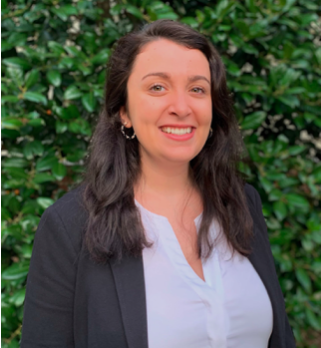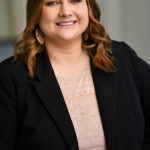Vanessa Rivero, Graduate Student at the UNC Gillings School of Global Public Health

Vanessa Rivero is a 2019 graduate of University of North Carolina with a degree in Biology and minor in Public Policy. She is currently pursuing her Masters of Public Health with a concentration in Maternal, Child, and Family Health at UNC Gillings School of Global Public Health. She served as a Title V Graduate Intern at the Alabama Department of Public Health this past summer, and currently works on the evaluation team at the National Maternal and Child Health Workforce Development Center, helping with data management and writing reports for internal quality improvement purposes. Vanessa would like to pursue a career in government, working to create policies and programs that help minority women obtain equitable access to the healthcare system, specifically preventive services.
Life provides learning opportunities in many different forms: through career, education, relationships, and more. My leadership journey was kickstarted by a very intimate loss in my family. My Mom passed away when I was 11 years old. Since that time, I have been driven to help families who have also been affected by cancer. The loss of my Mom at such a young age helped me realize what I wanted to do in my life, and using this grief to grow took a lot of self awareness and reflection.
Grief is deeply personal, and there is no one right way to manage these feelings or move forward. At 11 years old, I didn’t know what grief management looked like or how to navigate all my feelings in a healthy and productive way. I was guided by my father, who took his grief and started a small nonprofit that raised money to support families similar to ours. I was and still am so inspired by his ability to turn something so deeply sad into something that honored my Mom’s legacy. This inspiration propelled me into the public health sphere, specifically in Maternal and Child Health (MCH). When deciding what concentration I wanted to pursue in public health, I struggled because I wanted to help all women of all ages and I thought MCH was purely centered around a woman’s sexual and reproductive health. Now in my second year at Gillings, I know that MCH involves so much more than purely reproductive and early childhood care. MCH involves all aspects of a woman’s health, including preventive services, chronic disease management, geriatric care, and so much more. Discovering what path I wanted to take in graduate school involved a lot of self-reflection and understanding what I truly wanted out of my public health schooling experience.
Self awareness is required for growth and development, especially within leadership. Paul Nesbit from Macquarie University in Australia states that,
“Self-directed leadership development (SDLD) is conceptualized within a framework emphasizing a self understanding phase and a self-change phase that are dependent on the integrated operation of three skills concerning one’s ability to manage emotional reactions to feedback, to carry out effectively the practice of self-reflection, and to enact self regulatory processes for development.” 1
As someone who used to hate receiving and giving constructive feedback, I can wholeheartedly share that feedback is one of the most important aspects of being a public health leader. Whether it is getting feedback from stakeholders or getting feedback from people you work with, feedback is essential to developing and refining one’s leadership capabilities. Feedback also lets us know what we’re good at and what other people notice. What you might think is your greatest strength, might not be the aspect that people recognize the most from you. It’s important to elicit feedback from others and reciprocate that feedback for your own personal growth and to boost the development of those around you.
Self-reflection is often forgotten about in our busy and ever changing environment. Scheduling time to slow down and truly reflect on goals, strengths, motivations, etc. is hard to prioritize when there are so many other things that might seem more pressing. However, a study done by Giada Di Stefano and colleagues showed that team members who reflected for 15 minutes at the end of the day did 23.2% better in their performance than team members who did not reflect at all. 2 However, reflection might be uncomfortable at some points. I had to confront some really deep and unhappy feelings within myself during my own self-reflection, which wasn’t always pleasant and sometimes made me want to give up. When these feelings started to cloud my ability to reflect productively, I framed it as an opportunity and a leverage point for self-improvement and action.
Self-regulatory processes include goal-selection, goal-striving, and monitoring and evaluation actions. 1 These processes are cyclical and have no set duration or format. One common format is developing an action plan. An action plan should have specific goal-related tasks and include several points of self-reflection and evaluation throughout. For my own purposes, I set weekly schedules that include due dates for different things on my to-do list for the week. My to-do items are not solely revolved around schoolwork and usually involve things like meditating for 30 minutes a week, finishing a couple chapters in my book, or spending time outside with loved ones. Setting these plans help me maintain a healthy work life balance and help me move forward with my goals of becoming a strong and empowering MCH leader.
There are many different ways to approach self-reflection and there are a myriad of tools available to help strengthen your self-reflection muscle. Self-reflection can be uncomfortable and awkward, especially in an environment that teaches us that in order to be successful, we have to be busy all the time with way too much on our plates. As public health leaders, we need to create space for self-reflection within our own lives and encourage team members to do the same for themselves. Specifically, MCH leaders carry the heavy duty of protecting some of the most vulnerable populations. In order to effectively perform this duty, individuals in the MCH field need to ground themselves in self-reflection and understand that we need to be our best selves in order to best serve others.
Bibliography
- Nesbit PL. The Role of Self-Reflection, Emotional Management of Feedback, and Self-Regulation Processes in Self-Directed Leadership Development. Human Resource Development Review. 2012;11(2):203-226. doi:10.1177/1534484312439196
- Di Stefano G, Gino F, Pisano GP, Staats BR. Learning by Thinking: How Reflection Aids Performance. SSRN Journal. 2014. doi:10.2139/ssrn.2414478

